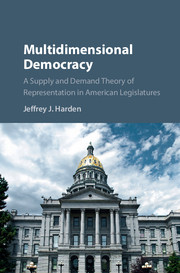Book contents
- Frontmatter
- Dedication
- Contents
- List of Figures
- List of Tables
- Acknowledgments
- 1 Responsiveness Beyond Roll Calls
- 2 A Supply and Demand Theory of Representation
- 3 Citizen Demand for the Dimensions of Representation
- 4 The Determinants of Legislators' Representational Priorities
- 5 Legislative Websites and the Dimensions of Representation
- 6 Unifying the Dimensions of Representation
- Appendix A Appendix to Chapter 3
- Appendix B Appendix to Chapter 4
- Appendix C Appendix to Chapter 5
- References
- Index
1 - Responsiveness Beyond Roll Calls
Published online by Cambridge University Press: 05 November 2015
- Frontmatter
- Dedication
- Contents
- List of Figures
- List of Tables
- Acknowledgments
- 1 Responsiveness Beyond Roll Calls
- 2 A Supply and Demand Theory of Representation
- 3 Citizen Demand for the Dimensions of Representation
- 4 The Determinants of Legislators' Representational Priorities
- 5 Legislative Websites and the Dimensions of Representation
- 6 Unifying the Dimensions of Representation
- Appendix A Appendix to Chapter 3
- Appendix B Appendix to Chapter 4
- Appendix C Appendix to Chapter 5
- References
- Index
Summary
Sydney Carlin has a challenging job. Since 2003 she has served as a Democratic state representative in Kansas, a decisively red state where Republican presidential candidates typically receive 60 percent of the popular vote. Rep. Carlin does represent the university town of Manhattan, which gives her something of a Democratic base. But in the 66th House District even Democratic presidential candidates have only managed 41 percent (2000), 41 percent (2004), and 51 percent (2008) of the vote in recent years. Simply put, her Democratic voting record is at odds with the preferences of many of her constituents. So it is not surprising that she consistently faces Republican challenges for her seat during election season. In an era when many state legislative districts are dominated by one party or the other and many races are not competitive, a big part of Rep. Carlin's job involves interacting with people who disagree with her policy views.
Yet despite this political environment, Rep. Carlin is well known and well liked in her district. Prior to serving in her current office she was commissioner, then mayor, of the city of Manhattan. She won the election for District 66 in 2002 with a 41 percent plurality, defeating a Republican and a Libertarian. Since then, she has won reelection over a Republican challenger six times with an average of more than 60 percent of the vote – an impressive feat when compared to the performances of Al Gore, John Kerry, and Barack Obama in the same district. Indeed, Rep. Carlin's experience yields an important question for understanding representation in American politics: How can a representative seem “out-of-step” with perhaps many of his or her constituents, yet still consistently win elections?
One reason for Sydney Carlin's success is the work she does for her constituents and her district outside of the roll call votes she casts in Topeka. With the attitude of doing “whatever is needed,” Rep. Carlin has developed a reputation as someone who is willing to listen and respond to a variety of constituents’ problems. For example, she has helped people obtain driver's licenses, deal with the aftermath of flooding, and get access to medication that they need. She assists businesses, churches, and homeowners threatened with losing their properties. Once she even brought together volunteers from the medical community to provide expensive treatment for a constituent who had no health insurance.
- Type
- Chapter
- Information
- Multidimensional DemocracyA Supply and Demand Theory of Representation in American Legislatures, pp. 1 - 18Publisher: Cambridge University PressPrint publication year: 2015



